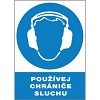According to the law, companies are obliged to place safety signs at escape routes and places, where there is a danger of health injury during work. It is up to the management of a company whether they mark a place with a sticker, or they use a plastic or enamelled plate. For the safety sign, it is important to be resistant to external effects. This means, for example, to sunlight, rain or various chemicals.
Correct placement? Where it cannot be overlooked
Signs must always be well visible and distinguishable. This means they are placed at a suitable height and there must not be lots of them at one place.
Consider sign location before its purchase. Labourers must see it well even in a dark workshop. Signs made of photo-luminescent (luminous) or reflexive material are often used at places with reduced visibility.
Another possibility is to illuminate the signs. Remember that you also need a back-up light source for some signs - to be visible even in case of power failure. This applies to marking of an escape exit or obstacles in escape routes.
Correct size is defined by ISO
For workers to read the signs comfortably, signs have to be large enough. Minimum dimensions are therefore determined by ČSN ISO 3864-1. According to it, the size is determined by the following equation:
h=l/Z or sign heigh = observation distance / factor of distance
The factor of distance is determined by ČSN ISO 3864-1 and it varies depending on the sign you work with. While maintaining the same distance, warning and prohibition signs have a larger minimum sizes than information and escape signs.
Type of sign can be recognized according to its shape and colour
Regulations also stipulate the appearance of pictograms in signs. They have to be clear, comprehensive and without unnecessary details which could impair their comprehension.
The appearance of safety signs is determined by governmental regulation. The czech regulation classifies signs to several groups according to their purpose:
| Prohibition signs | They contain a black pictogram on a white background. The pictogram is bordered with a red circle with a diagonal line (cross-out). An explanatory text is usually added to them. | 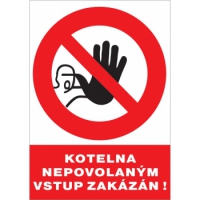 |
| Warning signs | They take the shape of a triangle with a black pictogram on a yellow background. The sign is bordered in black. An explanatory text is usually added. | 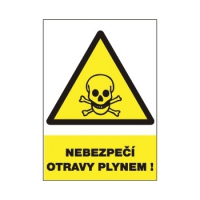 |
| Mandatory signs | Circular signs with a white pictogram on a blue background. Again, an explanatory text is usually added. | 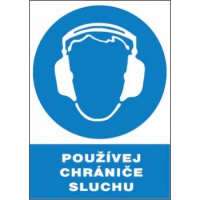 |
| Informative signs | They mark e.g. escape routes or first aid points. They take a square or rectangular shape in which there is a white pictogram and/or a text on a green background. | 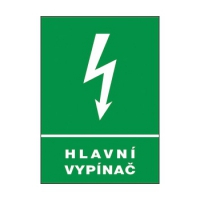 |
| Informative signs - fire prevention | Square or rectangular signs with a red background. There is a white pictogram and a text on it. | 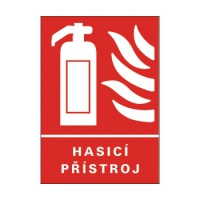 |
Where to place them
It has been said at the beginning that the use of safety signs is regulated by law. In the end, we would like to show you several examples where you must use them. It is, for example, for marking:
- evacuation lifts and escape routes,
- location of fire extinguishers (if they are located in large, unclear or hidden spaces),
- places where there is a threat of a fall of employees or objects,
- storages and boiler rooms.











